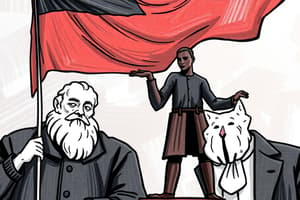Podcast
Questions and Answers
Which of the following is a central tenet of Marxist ideology?
Which of the following is a central tenet of Marxist ideology?
- Societal conflicts arise from the contradiction between social relations and the mode of production (correct)
- The state should prioritize individual freedoms over collective welfare
- Gender roles and hierarchies should be reinforced in society
- Private property and free markets are essential for economic progress
Which of the following is NOT a characteristic of modern liberalism?
Which of the following is NOT a characteristic of modern liberalism?
- Prioritizing social welfare and state intervention
- Addressing societal issues through government action
- Differing from classical liberalism in its approach to government intervention
- Advocating for the abolition of private property (correct)
Which of the following ideologies originated from the Age of Enlightenment and the Scientific Revolution?
Which of the following ideologies originated from the Age of Enlightenment and the Scientific Revolution?
- Maoism
- Liberalism (correct)
- Feminism
- Marxism
Which of the following ideologies emphasizes the participation of citizens in decision-making processes?
Which of the following ideologies emphasizes the participation of citizens in decision-making processes?
What is the primary focus of feminist theory?
What is the primary focus of feminist theory?
What is a key feature of classical liberalism?
What is a key feature of classical liberalism?
Which of the following ideologies challenges the notion of patriarchy as a normative theory in Western society?
Which of the following ideologies challenges the notion of patriarchy as a normative theory in Western society?
What is the primary goal of capitalism as an economic system?
What is the primary goal of capitalism as an economic system?
Which ideology emerged in the 19th century as a critique of capitalism and argued for the overthrow of capitalist exploitation?
Which ideology emerged in the 19th century as a critique of capitalism and argued for the overthrow of capitalist exploitation?
Which of the following ideologies is not explicitly mentioned in the given text?
Which of the following ideologies is not explicitly mentioned in the given text?
Which of the following is a characteristic of capitalism, according to the text?
Which of the following is a characteristic of capitalism, according to the text?
What is the origin of the term 'democracy' as mentioned in the text?
What is the origin of the term 'democracy' as mentioned in the text?
Study Notes
Western political thought encompasses a diverse array of ideologies, including democracy, capitalism, Marxism, feminism, and liberalism. These ideologies each offer unique perspectives on how societies should be governed and structured, reflecting distinct values, goals, and historical contexts.
Democracy
Democracy refers to a form of government where citizens participate in decision-making processes, either directly or indirectly through elected representatives. The roots of democracy can be traced back to ancient Greece, where the term comes from the Greek words "demos," meaning people, and "kratos," meaning rule. Over centuries, the concept of democracy has evolved, giving rise to various forms ranging from direct democracy to representative democracy.
Capitalism
Capitalism is an economic system that emphasizes individual property rights, free markets, and the pursuit of profit. It originated in Europe during the Industrial Revolution and has since become a dominant global economic structure. Characterized by private ownership of capital goods, wage labor, voluntary exchange between individuals, and competition among firms, capitalism seeks to maximize efficiency and productivity through market forces.
Marxism
Marxist thought emerged in the 19th century as a critique of capitalism, arguing for the overthrow of capitalist exploitation resulting from class struggle. Founded on the works of Karl Marx, this ideology posits that societal conflicts arise from the contradiction between the social relations of production and the mode of production itself. Marxist theories have influenced political movements around the world, leading to various interpretations such as Leninism, Trotskyism, and Maoism.
Feminism
Feminist theory emerged as a response to patriarchy, which was once considered a normative theory in Western society. Patriarchy refers to a social system in which males hold power over females and their roles are defined in terms of gender-based hierarchies. Feminists advocate for women's rights, equality, and empowerment, challenging traditional gender roles and seeking to dismantle systems of male domination.
Liberalism
Liberalism is a set of political ideas based on individual freedom and equal protection under the law. It originates from the Age of Enlightenment and the Scientific Revolution, emphasizing reason, individualism, and limited government intervention in personal lives. Liberal thought encompasses various subtypes such as classical liberalism, which focuses on individual rights and freedoms, and modern liberalism, which prioritizes social welfare and state intervention to address societal issues.
In summary, these ideologies shape Western political thought by providing frameworks for understanding power dynamics, economic structures, social equality, gender roles, and the role of the state. While they may have contrasting viewpoints, their ongoing dialogue contributes to the evolution of political theory and practice.
Studying That Suits You
Use AI to generate personalized quizzes and flashcards to suit your learning preferences.
Description
Explore the diverse array of ideologies in Western political thought, including democracy, capitalism, Marxism, feminism, and liberalism. Learn about the values, goals, and historical contexts that shape these ideologies and their impact on governance, economics, gender roles, and societal structures.




